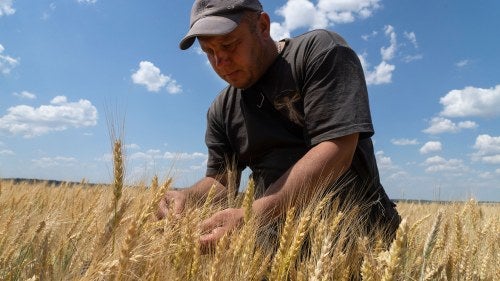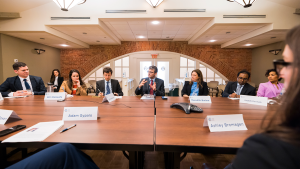Super Seaweed, True Stars of Wimbledon, and Ancient Wisdom
Check out our roundup of the week's top news and research in food, agriculture, and global development.

Top Story
Russia Suspends Black Sea Grain Deal
Russia did not extend the Black Sea Grain Initiative created by the UN and Turkey, which previously allowed Ukraine to export grain through a protected corridor. With global hunger already on the rise, the suspension of the deal could not come at a worse time. Russia is demanding approval to export fertilizer and food before reinstating the agreement.
Council Insights
New Faces
“I'm thrilled to join the Council as a nonresident fellow because I deeply value the mission of increasing knowledge and engagement in global affairs in a nonpartisan, research-driven way,” said our new Nonresident Fellow Caitlin Grady. “I hope to work in partnership with the Council to advance innovative solutions to pressing challenges facing food and agricultural sustainability in the face of climate change.”


Food and Agriculture
Korean Climate Crisis
South Korea’s president is calling for a new climate plan, following record-breaking floodings and landslides. Over 10,000 people blamed poor government preparation as they were evacuated. North Korea’s status is unknown, but state reports indicate poor food shortage prevention measures and extreme weather.
Strawberries, the True Stars of Wimbledon
Every day of the Wimbledon tennis tournament, a 32-person team at Hugh Lowe Farms transports roughly 170,000 strawberries for the event’s symbolic strawberries and cream. Last year, the event provided 249,470 servings of strawberries.
Hypocritical Requests
Like the US and Europe, China is suffering from high temperatures, threatening crop harvests. Climate envoy John Kerry is visiting China to promote joint climate initiatives, encouraging China to reduce coal and ethane use—a request China sees as hypocritical coming from the US.
Deeper Dive
What Is the Black Sea Grain Initiative?
Ukraine has exported roughly 33 million tons of food through the Black Sea Grain Initiative, a deal with Russia that allows safe passage of food exports through the Black Sea. The deal was designed to avert famine by injecting more foodstuffs and other products into world markets for humanitarian needs. Over half of the exports have gone to countries who also rely on aid from the WFP.
Resilience
Super Seaweed
Seaweed is starting to attract international attention for its potential to become an eco-friendly supercrop. From carbon absorption to reducing methane emissions from cattle, the potential uses for seaweed are numerous. It can even act as a natural fertilizer, helping plants grow faster and stronger.
DC Report
Climate-Smart Agriculture
The Biden administration has allocated $3.1 billion to a USDA program aiming to reduce the agricultural sector's greenhouse gas emissions. The program funds projects that encourage farmers to adopt practices such as reducing soil tilling, planting cover crops, and improving fertilizer and manure usage, which are believed to either reduce emissions or capture carbon dioxide.
Big Actors
Price Competition
Cell-cultivated meat companies face an uphill battle in challenging conventional meat. However, if they scale up and lower costs, it’s possible cell-cultivated meat could become a more environmentally friendly option enticing for vegetarians and vegans. To become price competitive, it must reach a production cost of $2.92 per pound.
Big Ideas
Ancient Wisdom
Farmers in Spain are turning to “ancient wisdom” to adapt to the crises of climate change. Using a low-cost and effective sprawling network of irrigation canals, called acequias, farmers can slow down water flow from the mountains to the plains to better retain and distribute it.
Ask an Expert
How is the symbolic importance of food influenced by socioeconomic status?
"Socioeconomic status doesn’t just influence a person’s ability to access or afford food – it can also shape the very meaning of food itself. One example: in my research, I found that “junk” food meant something dramatically different to mothers raising their children in poverty compared to those doing the same in affluence. While lower-income moms often said yes to their kids’ requests for junk food to provide love and affection to their children within contexts of deprivation, higher-income moms often said no to those same requests in a similar effort to care for their kids within contexts of abundance. These divergent – and generally overlooked – symbolic meanings are central to the story of food and nutrition inequity in the US today.”
— Nonresident Fellow Dr. Priya Fielding-Singh


Have a question about food and agriculture? Ask one of our experts at the Center on Global Food and Agriculture to get an answer in next week's Global Food for Thought!
Council Events
Did you miss one of our previous livestreams? Don't worry! They are all available on our website to watch at any time.
Other Upcoming Events
2023 Agricultural and Applied Economics Association Annual Meeting
Date: July 23 – 25
Free Webinar: Using Online Data Tools in your Farmland Search
Date: July 26
Time: 7:00 – 8:30 p.m. CT
Empowering Eaters: Access, Affordability, and Healthy Choices Summit
Date: August 2
Time: 11:30 – 7:30 p.m. CT
MFAI Emerging Crops for Soil Health Field Day
Date: August 9
Time: 10:00 – 1:30 p.m. CT
Free Webinar: Expanding Your Farm Business Through the Working Farms Fund
Date: August 9
Time: 6:00 – 7:00 p.m. CT
Land Acknowledgement Statement
The Center on Global Food and Agriculture recognizes it occupies the ancestral land of the Kiikaapoi, Peoria, Kaskaskia, Bodwéwadmi, and Myaamia people. Indigenous communities around the world disproportionately experience the pressures of climate change, global conflicts, and the COVID-19 pandemic, while simultaneously stewarding 80 percent of the world’s biodiversity. These Indigenous tribes and nations are the original owners of this land and continue to be systemically erased by policies and practices that ignore their histories. To learn more about Indigenous foodways and practices, check out our 2022 blog series "Stewardship, Sovereignty, and Solutions."
Related Content
- Embracing Dandelions as Food and Medicine
- Going Beyond Regenerative Agriculture on Tribal Lands
- Expanding "638" to Enhance Native American Food Sovereignty
- Flavors and Culture: Food Systems Through Indigenous Women's Eyes
- A Thanksgiving Legacy: Fighting for Indigenous Food Sovereignty
- Native Food Sovereignty: Strengthening Connection to Culture
- Reconnecting to Indigenous Food Sovereignty Values and Practices
- Embracing Interconnectedness: How Indigenous Foodways Can Save Us






